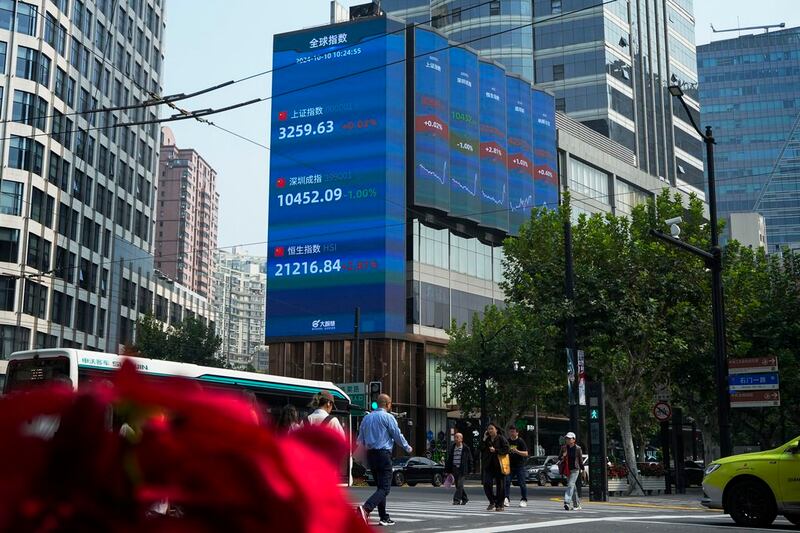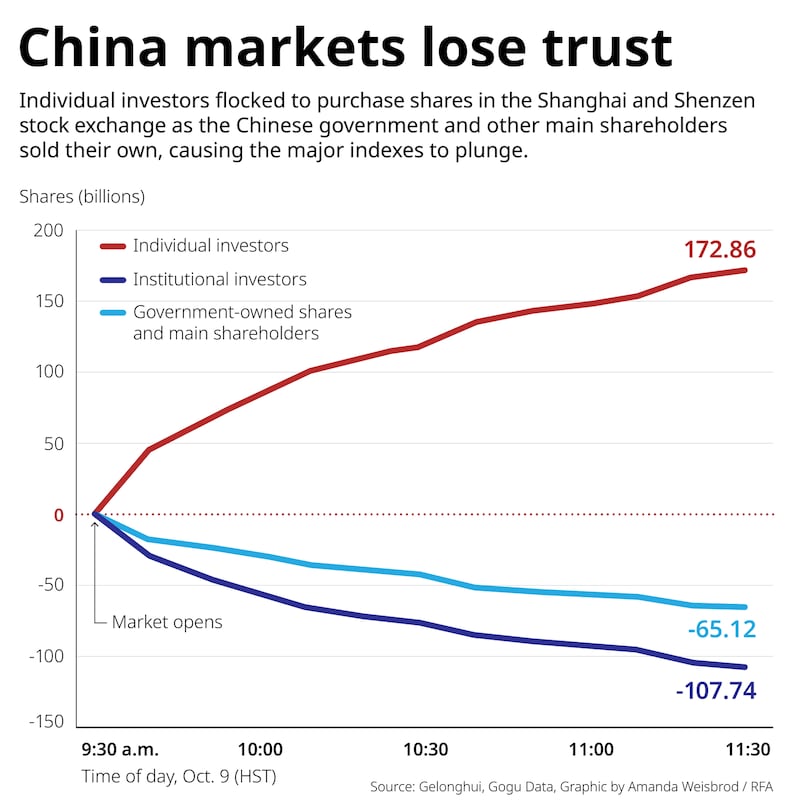[ Read this story in Cantonese.Opens in new window ]
Individual investors, some of them first-timers who rushed to set up trading accounts during a recent rally in Chinese stock markets, are taking huge risks if they buy shares now in hope of a bull market, commentators have warned.
Analysts have warned in recent days that the recent rallies in Shanghai, Shenzhen and Hong Kong on expectations of a fiscal stimulus package from Beijing are highly risky for individuals trying to maximize the value of their life savings.
A Beijing stockholder who gave only the nickname Wang Cong said he was among those who rushed back into the market as shares started to rally following an initial package of economic stimulus measures announced on Sept. 24.

But retail investors were soon left high and dry, as markets plunged following a news conference by the National Development and Reform Commission on Tuesday that analysts said was far too thin on detail about long-awaited stimulus measures.
"The small amounts retail investors put in weren't enough, and the dominant forces prevailed," Wang said of the government, which has since announced that the Ministry of Finance will hold another news conference Saturday on boosting economic growth. "They just mess with the markets as they see fit."
‘Leeks’
The plunge may quickly make enthusiastic retail investors distrustful, Wang said. "It's not enough to harvest us like leeks; they want to break our bones and suck the very marrow out."
"Leeks" is a slang word frequently used on social media to describe ordinary people with little power over their fate, and was a trending hashtag on Chinese social media as the markets' rally appeared to falter.
"Are the new leeks crying now?" quipped Weibo user Wuhan_Liu_Zhengtao, in a reference to the reported inrush of new stock market investors since the rally started in September, many of whom likely suffered losses in Shanghai, Shenzhen and Hong Kong in recent days.
"So do I need to close my account right after I opened it?" @Vengeful_Red_Panda wanted to know. "Us new investors are scared [cry-laugh] #A-shares"
"I wonder how many of those leeks who went all in after the holidays are sleeping at night now," commented @CoolCooooL. "Looks like they bled out."

Shanghai-based trading platform Eastmoney.com reported on Oct. 8 that while major funds recorded a net outflow of more than 210 billion yuan (US$29.6 billion) from markets in Shanghai and Shenzhen, "small and medium" orders recorded a net inflow "of similar magnitude."
Trying to control the market?
Financial commentator He Jiangbing said that the recent market correction could have been the result of profit-taking by institutional accounts, or a bid by the government to cool the markets down.
"The government feels like they must control the pace, because they worry if the market rises [too fast], yet they also fear it falling [too fast]," He told RFA Cantonese in a recent interview.
He said it was too early to say ahead of Saturday's news conference whether the government has failed to support the markets.
While there is no official data on retail investors' role in market movements, China's security regulator said in a 2022 report that Chinese retail investors typically make strongly speculative moves, trade frequently, buying winners and selling losers on online platforms like Alipay, often based on preset formulas.
Meanwhile, Hong Kong stock commentator Agnes Wu had a warning for retail investors.
"If you're a leek who enters the market without careful consideration, then you're ripe for harvesting," Wu said, saying investors should always pay close attention to the movement of bellwether stocks and market fundamentals.
"The higher your hopes, the greater the disappointment," she said, adding that investors shouldn't panic in the short term.
Financial commentator Joseph Ngan said reports had emerged on social media in recent days of huge lines of people waiting to open brokerage accounts, including hospital patients in wheelchairs and delivery riders with unfulfilled orders.
"But what will be the consequences once the bubble bursts?" he asked.
Translated by Luisetta Mudie. Edited by Malcolm Foster.
